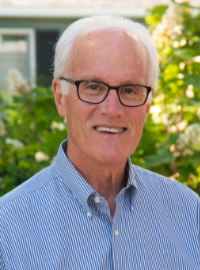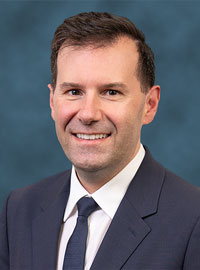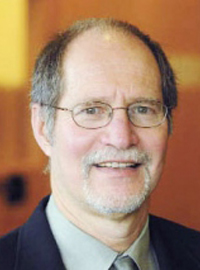12:00 PM — 12:10 PM: Welcome / Introduction with Ritesh Mistry, PhD
12:10 PM — 12:55 PM Keynote Lectures: The value of computational modeling in regulatory decision making for tobacco and nicotine products
- Session chair: Ritesh Mistry
- 12:10 PM — 12:25 PM: “Contributions of computational modeling to tobacco regulation decision making – present and future” with Kenneth E. Warner, PhD
- ❏ Watch this presentation❏ Slides from this presentation
- About this presenter and presentation +
 Kenneth E. Warner, PhD
Kenneth E. Warner, PhD- “Contributions of computational modeling to tobacco regulation decision making – present and future”
- This presentation will provide a brief overview of how tobacco modeling research has contributed important evidence to tobacco regulation decision making, most notably including the FDA’s consideration of prohibiting menthol in cigarettes and other combusted tobacco products. It will then turn to the potential of contemporary and future research to inform future regulatory decision making. Noteworthy here are the foci of this symposium: nicotine reduction and flavor restrictions. For both of these, regulations could pertain to either or both conventional tobacco products and reduced risk products. A challenge regarding ongoing and future research will entail evaluating the likely consequences of combining regulations. Examples include a menthol cigarette ban with and without a menthol ban in reduced risk products, and a reduced nicotine regulation with and without the availability of consumer-attractive reduced risk nicotine-delivery products.
- Kenneth E. Warner, PhD
- University of Michigan: Avedis Donabedian Distinguished University Professor Emeritus of Public Health; Professor Emeritus of Health Management & Policy; Dean Emeritus of Public Health
- Profile: sph.umich.edu
- Kenneth E. Warner is the Avedis Donabedian Distinguished University Professor Emeritus of Public Health and Dean Emeritus at the University of Michigan School of Public Health, where he was on the faculty from 1972-2017. He served as Dean from 2005-2010 and as a department chair from 1982-88 and 1992-95. An economist, Dr. Warner earned his A.B. degree from Dartmouth College and M.Phil. and Ph.D. degrees from Yale University.
- Presented in over 300 professional publications, including 7 books, Dr. Warner’s research has focused on tobacco and health policy. Dr. Warner served as the World Bank’s representative to negotiations on the Framework Convention on Tobacco Control. He also served as the Senior Scientific Editor of the 25th anniversary Surgeon General’s report on smoking and health. During 2004-05 he was President of the Society for Research on Nicotine and Tobacco. He was a founding member of the Board of Directors of the Truth Initiative and was recently a member of the FDA Tobacco Products Scientific Advisory Committee. He is currently an elected member of the Board of Trustees of Northwestern Michigan College Dr. Warner’s honors and awards include: the Surgeon General’s Medallion, conferred by Dr. C. Everett Koop in 1989; election to membership in the National Academy of Medicine in 1996; a Luther L. Terry Award for Exemplary Leadership in Tobacco Control in 2003; the Alton Ochsner Award Relating Smoking and Disease in 2010; and the triennial Doll-Wynder Award from the Society for Research on Nicotine and Tobacco in 2017.
- 12:25 PM — 12:40 PM: “The use of modeling in tobacco regulatory science: insights from CTP” with Brian King, PhD, MPH
- ❏ Watch this presentation❏ Slides from this presentation
- About this presenter and presentation +
 Brian King, PhD, MPH
Brian King, PhD, MPH- “The use of modeling in tobacco regulatory science: insights from CTP”
- FDA’s Center for Tobacco Products Director Brian King, PhD, MPH will discuss the importance of modeling in tobacco regulatory science and how the Center has been using modeling to advance new tobacco regulatory actions. Specifically, Dr. King will highlight how simulation modeling has helped the Center move forward on the menthol cigarettes and flavored cigars product standards, in addition to the planned proposed nicotine product standard, by helping to assess, for example, the potential impacts of these actions on short- and long-term measures of tobacco product use, morbidity, and mortality.
- Brian King, PhD, MPH
- Food and Drug Administration: Director of the Center for Tobacco Products at the U.S. Food and Drug Administration (FDA)
- Profile: fda.gov
- Dr. Brian King was appointed Director of the Food and Drug Administration’s Center for Tobacco Products (CTP) in July 2022. In this position, Dr. King is responsible for assuring that CTP accomplishes its public health goals and for operationalizing the Center’s vision and mission as it implements the Family Smoking Prevention and Tobacco Control Act.
- Dr. King has worked for nearly two decades to provide sound scientific evidence to inform tobacco control policy and to effectively communicate this information to key stakeholders, including decision makers, the media, and the general public. Prior to joining FDA, he served as the Deputy Director for Research Translation in CDC’s Office on Smoking and Health, and more recently as the Executive Editor of CDC’s Morbidity & Mortality Weekly Report Series. He has authored more than 200 scientific journal articles related to tobacco prevention and control, served as Senior Associate Editor for multiple U.S. Surgeon General’s Reports on tobacco, and was lead author of CDC’s 2014 evidence-based guide, “Best Practices for Comprehensive Tobacco Control Programs.” Dr. King holds a Ph.D. and M.P.H. in Epidemiology from the State University of New York at Buffalo.
- 12:40 PM — 12:55 PM: Keynote Q & A with Brian King, PhD, MPH and Kenneth E. Warner, PhD
- ❏ Watch this presentation
- 12:55 PM — 1:05 PM: Break
1:05 PM — 2:45 PM Session One: Very low nicotine content cigarettes: Regulatory considerations and empirical evidence
- Speakers will focus on how the CTP regulatory framework applies to regulating nicotine in cigarette products, how nicotine concentration is associated with nicotine addiction, and clinical trial evidence in this area.
- Session chair: Luz Sanchez Romero
- 1:05 PM — 1:10 PM: Session One Introduction with Luz Sanchez Romero, MD, MSc, PhD
- ❏ Watch this presentation
- 1:10 PM — 1:30 PM: “Overview of FDA regulatory framework for very low nicotine cigarettes” with Mitch Zeller, JD
- ❏ Watch this presentation❏ Slides from this presentation
- About this presenter and presentation +
 Mitch Zeller, JD
Mitch Zeller, JD- “Overview of FDA regulatory framework for very low nicotine cigarettes”
- An overview of the tobacco industry’s understanding of the true role of nicotine and an explanation of the statutory and regulatory framework under which FDA intends to mandate reductions in the nicotine content of combustible cigarettes and other combustible products.
- Mitch Zeller, JD
- Qnovia, Inc.: Policy and Regulatory Strategy Advisor; Retired, Former Director of the Center for Tobacco Products at the U.S. Food and Drug Administration (FDA)
- Mitch Zeller, J.D., retired from federal service in April 2022 and recently joined Qnovia, Inc., a pharma company developing inhaled therapeutics across a variety of indication areas, as a policy and regulatory strategy advisor. He was the director of the FDA’s Center for Tobacco Products from March 2013 through April 2022. The mission of CTP—established by enactment of the 2009 Family Smoking Prevention and Tobacco Control Act—is “to make tobacco-related death and disease part of America’s past, not America’s future, and, by doing so, ensure a healthier life for every American family.” As Center Director, Zeller led FDA’s efforts to use the tools of product regulation to reduce disease and death from tobacco use and bring previously unavailable information about its dangers to light. Zeller, a graduate of Dartmouth College and the American University Washington College of Law, worked on FDA issues from 1982 until his retirement in 2022. He began his career as a public interest attorney in 1982 at the Center for Science in the Public Interest (CSPI). In 1988, Zeller left CSPI to become counsel to the Human Resources and Intergovernmental Relations Subcommittee of the House of Representatives Government Operations Committee where he conducted oversight of enforcement of federal health and safety laws. In 1993, Zeller joined the staff of then-FDA Commissioner Dr. David Kessler, M.D. What began as a two-week assignment by Kessler in 1994 to examine the practices of the tobacco industry led to his serving as associate commissioner and director of FDA’s first Office of Tobacco Programs. Instrumental in crafting the agency’s 1996 tobacco regulations, Zeller also represented FDA before Congress, federal and state agencies. Zeller also served as an official U.S. delegate to the World Health Organization (WHO) Working Group for the Framework Convention on Tobacco Control. In 2000, Zeller left FDA to continue his work for tobacco control as executive vice president of the American Legacy Foundation. His responsibilities there included marketing, communications, strategic partnerships, and creating the foundation’s first Office of Policy and Government Relations. In 2002, Zeller joined Pinney Associates where, as senior vice president, he provided strategic planning and communications advice on domestic and global public health policy issues involving the treatment of tobacco dependence and the regulation of tobacco products and pharmaceuticals. He left Pinney Associates in 2013 upon his return to FDA as Center Director.
- 1:30 PM — 1:50 PM: “Nicotine addiction: from biology to regulatory policy” with Neal Benowitz, MD
- ❏ Watch this presentation❏ Slides from this presentation
- About this presenter and presentation +
 Neal Benowitz, MD
Neal Benowitz, MD- “Nicotine addiction: from biology to regulatory policy”
- A brief review of nicotine pharmacology and addiction, and translation of nicotine pharmacology to regulatory policy for the promotion of public health.
- Neal Benowitz, MD
- University of California - San Francisco: Professor in Residence
- Profile: profiles.ucsf.edu
- Neal Benowitz, MD is a Professor of Medicine at the University of California, San Francisco. He has been conducting research at UCSF since 1973. His research focus is on the human pharmacology of nicotine in relation to pathogenesis of and individual differences in vulnerability to tobacco-related disease, and the use of pharmacologic data as a basis for public health policies to prevent and reduce such disease. He has served on a number of national and international committees addressing issues in tobacco-related diseases and smoking cessation, including several sponsored by the Institute of Medicine. He has authored over 500 publications, including a state-of-the-art review on nicotine addiction in the New England Journal of Medicine in June 2010.
- 1:50 PM — 2:10 PM: “Reducing nicotine in cigarettes: the science ” with Dorothy Hatsukami, PhD
- ❏ Watch this presentation❏ Slides from this presentation
- About this presenter and presentation +
 Dorothy Hatsukami, PhD
Dorothy Hatsukami, PhD- “Reducing nicotine in cigarettes: the science ”
- Since the passage of the Family Smoking Prevention and Tobacco Control Act, there has been a burgeoning of scientific studies examining the effects of switching people who smoke (PWS) to reduced nicotine content cigarettes. Much of the groundwork for this research was established through meetings that were convened to examine the existing scientific literature on this topic, to determine the feasibility of reducing nicotine in cigarettes as a public health measure and, if determined to be feasible, to develop a research agenda. Based on this research agenda, we now know a nicotine dose that reduces the number of cigarettes smoked, toxicant exposure and cigarette dependence, and increases quitting behaviors (0.4 mg nicotine per gram of tobacco) across different populations of PWS. We also know that an immediate vs. a gradual reduction in nicotine content in cigarettes is likely to result in greater public health benefit sooner. However, this approach is likely to require the availability of less harmful alternative nicotine delivery systems (ANDS), such as nicotine replacement therapies or electronic cigarettes, to deal with the need to seek nicotine from other sources. Most of the prior studies have been conducted without access to ANDS. In a recent study that involved access to an experimental marketplace with non-combustible ANDS, we found a greater reduction in number of cigarettes smoker per day accompanied by significant reductions in toxicant exposures in PWS assigned the very low nicotine content (VLNC) cigarettes compared to the normal nicotine content (NNC) cigarettes . We also saw greater uptake of exclusive use of noncombustible ANDS over time in the VLNC condition. Provided these findings, future directions for research will be discussed.
- Dorothy Hatsukami, PhD
- University of Minnesota: Professor
- Profile: psychiatry.umn.edu
- Dorothy K. Hatsukami, Ph.D. is the Professor of Psychiatry and Behavioral Sciences, Forster Family Chair in Cancer Prevention and Associate Director of Cancer Prevention and Control of the Masonic Cancer Center at the University of Minnesota. Her areas of expertise include nicotine addiction and its treatment, and tobacco regulatory science assessing the toxicity, appeal and addictiveness of various tobacco products. She has over 500 peer reviewed publications, edited a book on tobacco and cancer and contributed to Surgeon General’s Reports. She has served on numerous scientific advisory boards or councils for U.S. government agencies, including NIDA, SAMSHA, ONDCP, Interagency Committee on Smoking and Health, and the FDA Tobacco Product Scientific Advisory Committees. She is currently a member of the World Health Organization Study Group on Tobacco Product Regulation and the National Cancer Institute, Board of Scientific Advisors. She was past president for the Society for Research on Nicotine and Tobacco and the College on Problems of Drug Dependence.
- 2:10 PM — 2:35 PM: Session One Q & A with Dorothy Hatsukami, PhD and Mitch Zeller, JD
- ❏ Watch this presentation
- 2:35 PM — 2:45 PM: Break
2:45 PM — 4:50 PM Session Two: Modeling the impact of very low nicotine content cigarette regulations
- Speakers will share results from computational modeling studies about the impact of VLNC cigarette regulations in the US context and in New Zealand.
- Session chair: Ruoyan Sun
- 2:45 PM — 2:50 PM: Session Two Introduction with Ruoyan Sun, PhD
- ❏ Watch this presentation
- 2:50 PM — 3:10 PM: “The public health gains had cigarette companies chosen to sell very low nicotine cigarettes” with David Levy, PhD
- ❏ Watch this presentation❏ Slides from this presentation
- About this presenter and presentation +
 David Levy, PhD
David Levy, PhD- “The public health gains had cigarette companies chosen to sell very low nicotine cigarettes”
- A modeling study that estimates the public health gains had cigarette companies chosen to sell very low nicotine cigarettes beginning with when they had the technical capability.
- David Levy, PhD
- Georgetown University: Professor, Georgetown University Medical Center; CAsToR Principal Investigator
- Profile: georgetown.edu
- Dr. David Levy is PI for CAsToR at Georgetown University and co-Lead of Projects 1 - 3, and the Research Assessment and Input Development Core. He received his PhD in Economics from UCLA (USA), and is currently a Professor of Oncology at Georgetown University. He has published over 350 articles, in renowned journals such as the American Economic Review, BMJ, AJPH, JAMA, The Lancet, Tobacco Control, and PLOS Medicine. He has been principal investigator of grants from the CDC, WHO, the National Cancer Institute, and Bloomberg/Gates Foundation. Dr. Levy currently oversees the design and development of the SimSmoke tobacco policy simulation model, for which he has developed models for over 40 countries covering 85% of the world’s population, and has recently developed models of smokeless tobacco and e-cigarette use. In addition to being a principal investigator on the TCORS grant, he is currently a principal investor on a National Cancer Institute grant with the International Tobacco Control Policy Evaluation Project (theITCProject) in which he has developed models of e-cigarette use for Canada and England; and is a principal investigator in the National Cancer Institute CISNET Lung Group. He has recently published articles providing a public health framework and the Smoking and Vaping Model (SAVM) for evaluating e-cigarettes and showing the potential benefits of e-cigarettes. He has also developed a version of that model to examine the impact if cigarette companies had started marketing very low nicotine delivery cigarettes in earlier years when the risk of smoking had become clear.
- 3:10 PM — 3:30 PM: “Modeling the potential impact of instantaneous versus gradual VLNC regulation on smoking prevalence and associated mortality” with David Mendez, PhD
- ❏ Watch this presentation❏ Slides from this presentation
- About this presenter and presentation +
 David Mendez, PhD
David Mendez, PhD- “Modeling the potential impact of instantaneous versus gradual VLNC regulation on smoking prevalence and associated mortality”
- Dr. Mendez will present a modeling study that examines multiple scenarios to compare the population effects on premature mortality of reducing nicotine in cigarettes to non-addictive levels instantaneously versus gradually.
- David Mendez, PhD
- University of Michigan: Professor of Health Management and Policy
- Dr. David Mendez is an Professor in the Department of Health Management and Policy at the University of Michigan. His research focuses on modeling the public health impact of potential tobacco and nicotine product regulations, including nicotine reduction, menthol bans, and trends of cigarette smoking cessation or switching to e-cigarettes. Dr. Mendez’s research also investigates the financial implications of these trends, with specific focus on tobacco control in the United States.
- 3:30 PM — 3:50 PM: “Tobacco endgame in New Zealand: could it achieve less than 5% prevalence by 2025, and what are the health and productivity gains?” with Tony Blakely, MBChB, MPH, PhD
- ❏ Watch this presentation❏ Slides from this presentation
- About this presenter and presentation +
 Tony Blakely, MBChB, MPH, PhD
Tony Blakely, MBChB, MPH, PhD- “Tobacco endgame in New Zealand: could it achieve less than 5% prevalence by 2025, and what are the health and productivity gains?”
- Aotearoa-New Zealand has embarked on a bold tobacco endgame, namely: all retail tobacco to be very low nicotine content; 90% to 95% reduction in tobacco retail outlets; and a tobacco free generation whereby people born in 2008 or later can never legally purchase tobacco. We were commissioned by the New Zealand Government to simulate the health, health inequality, and cost impacts of these policies to inform Government and Cabinet deliberations leading up to the passing of the legislation in December 2022. Our modelling demonstrated large health gains, large reductions in health inequalities (e.g. a near-25% reduction in Māori:non-Māori mortality rate inequalities), and large savings in health system expenditure and gains in income productivity. This modelling both assisted a world-first tobacco endgame policy to be implemented and highlights sources of uncertainty in the underlying data inputs. This presentation will go behind the main modelling outputs to consider the modeling method, data (un)certainties, and future research priorities.
- Tony Blakely, MBChB, MPH, PhD
- University of Melbourne: Affiliate Professor
- Tony is an epidemiologist and public health medicine specialist at the University of Melbourne since 2019, and previously at the University of Otago, Wellington, New Zealand. He leads research assessing the impacts of interventions on health gains, health inequalities, and health expenditure. He led the modelling for the New Zealand Government of its endgame policy (VLNC mandatory, 95% reduction in tobacco retail outlets and a tobacco free generation) that has subsequently passed into legislation. Tony is head of the Population Interventions Unit (and the Scalable Health Intervention Evaluation program) at the University of Melbourne. From 2023 to 2024, he is also Chair of the New Zealand Royal Commission on COVID-19 Lessons Learned.
- 3:50 PM — 4:00 PM: Break
- 4:00 PM — 4:20 PM: “Modeling approach to quantify the potential public health effects of reducing nicotine levels in cigarettes in the United States” with Esther Salazar, PhD
- ❏ Watch this presentation❏ Slides from this presentation
- About this presenter and presentation +
 Esther Salazar, PhD
Esther Salazar, PhD- “Modeling approach to quantify the potential public health effects of reducing nicotine levels in cigarettes in the United States”
- Population models have been used in tobacco regulatory science to model the potential impact of a regulatory policy on the population as a whole, including users and nonusers of tobacco products, as well as to evaluate the potential population health impact associated with the introduction of new tobacco products through Premarket Tobacco Product Application and Substantial Equivalence pathways. This presentation will focus on describing a modeling strategy used by CTP to quantify the potential public health effects of enacting a regulation in the United States that makes cigarettes minimally addictive by setting a maximum level of nicotine in cigarettes. Also, it will point out some challenges regarding the construction of input model parameters and assumptions needed to populate these models.
- Esther Salazar, PhD
- Food and Drug Administration: Lead Mathematical Statistician, Center for Tobacco Products, Office of Science
- Dr. Esther Salazar is a Senior Mathematical Statistician in the Center for Tobacco Products (CTP) at the U.S. Food and Drug Administration (FDA). She received her MS and PhD in Statistics from the Federal University of Rio de Janeiro. She also completed post-doctoral training in the Department of Statistical Science at Duke University and the Statistical and Applied Mathematical Sciences Institute (SAMSI), in North Carolina. Prior to joining the FDA, Dr. Salazar was a Research Assistant Professor in the Electrical and Computer Engineering Department at Duke University. Her research activities focus on health effects of tobacco product use, population modeling, survey data analysis, text mining, machine learning techniques for big data, and Bayesian analysis. At the FDA, Dr. Salazar has been actively collaborating with modeling and simulation activities that can be used to assess the health impact of tobacco policies and tobacco product market authorization in the U.S.
- 4:20 PM — 4:50 PM: Session Two Q & A with Tony Blakely, MBChB, MPH, PhD, David Levy, PhD, David Mendez, PhD and Esther Salazar, PhD
- ❏ Watch this presentation